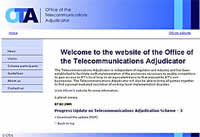 The Independent Office of the Telecoms Adjudicator (OTA) has issued an update on their progress of ‘local loop unbundling’ (LLU – the process of opening BT’s exchanges to competitors).
The Independent Office of the Telecoms Adjudicator (OTA) has issued an update on their progress of ‘local loop unbundling’ (LLU – the process of opening BT’s exchanges to competitors).
The speed of unbundling, or in this case lack of it has a direct effect on the range of competitive broadband providers, and therefore the speed of services that can be provided and their cost.
To date, some 31,000 lines have been unbundled, but the OTA update reads: “Good. But could do better.”
There are reports of variable performance in some operational areas, with performance lagging behind the OTA Key Performance Indicator, ‘Right First Time’. This snappily monikered indicator checks to see if services are being delivered in time to meet customers’ expectations.
The OTA has set a target of 75% with actual delivery being variable at 50-60%. This target rises to 85% in the near future.
The number of lines unbundled has grown from 12,000 in May 2004 to 31,000 lines unbundled by 31 January 2005.
Once again, this falls behind the OTA target, which had specified 50,000 unbundled lines by February 2005.
The Telecoms Adjudicator Scheme is successfully underway, with 14 companies signed up, and encouraging noises about investment commitment, have been heard.
LLU price reductions were implemented from 1 January 2005, and there are more price reductions on the horizon.
Despite all this, LLU operators continue to experience operational problems and variable delivery performance isn’t doing wonders for the operators’ marketing plans.
The Adjudicator’s update tells it like it is: as the orders keep rolling in, operational performance is the key to success for LLU.
Independent Office of the Telecoms Adjudicator
Ofcomwatch comments on it.